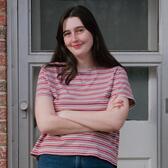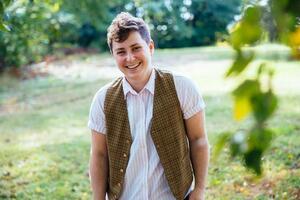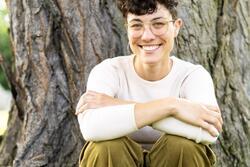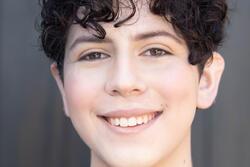7 Questions For Musician Batya Levine
JWA chats with musician, song and prayer leader, and cultural organizer Batya Levine.
JWA: You describe your most recent album, Yivarechecha, as “a collection of songs to bless you in the depths of our broken world.” How does that speak to your songwriting philosophy and practice as a whole?
Batya Levine: I experience the music that comes through me as medicinal in some way. I often will receive a song because I need it. My music is often born out of inspiration, but not in the sense that I am “feeling inspired,” per se—it’s more that when I’m experiencing a deep emotion, or struggling with something internally, I’ll reach inwards—towards Hashem and song—to see if there is anything that wants to come through. The music that comes sometimes speaks directly to me or offers an expression for my internal state, which is healing. I really started receiving music in the context of community, and sharing that music with others felt like a natural reciprocity. I wanted to share back the songs I was receiving with a circle wider than myself, in case they were somehow useful or resonant to others, like so many songs are for me. That’s still how I see it.
JWA: Has music always been intertwined with your faith?
BL: For as long as I can remember. I was raised in a very spiritual and songful Modern Orthodox home with a family who loved to sing. I was also raised immersed in a lot of folk music—my dad owns a guitar shop, and my parents were both hippies back in the day. Don’t get me wrong, I will get down to pop music any day (and I do!). For me, that’s also a form of spiritual expression —connecting to joy, or a sense of power, or just something to move your body to—which inevitably helps me connect with a wider sense of Divinity/Interconnection/Hashem in my life. My favorite band is Phish, and though they are technically a secular band, any Phishhead will tell you—they are delving into the spiritual depths with their music. The core connection and resonance I have with all music (from Phish, to pop, to High Holiday tunes) has always been rooted in a deeper place that helps me feel connected to Life itself, which for me, always comes back to Hashem.
JWA: Tell us more about the organization you co-founded, Let My People Sing!
BL: I helped co-found Let My People Sing! in 2015, which started as a labor of love from a group of friends and has grown into a more steady and sustainable organization over the years. This project is so near and dear to my heart, and encapsulates so much of what I want to see in the Jewish world. Let My People Sing! is a cultural project dedicated to expanding the ancient and transformative practice of Jewish communal singing. We gather in multiracial, multicultural and genderful Jewish community, uplifting songs and leaders historically and ongoingly pushed to the margins. Together, we transmit and reclaim diasporic Jewish singing traditions, celebrate original music emerging from our communities, and create heart-centered gatherings where we can all be leaders and learners of song. We envision a more liberated world, overflowing with song and prayer, in which Jewish communities are resourced by our musical traditions. We imagine communities where the interdependence we practice when singing together is woven into the ways we care for each other, share resources, build a more liberated world, and deepen our connection to ourselves and to the Divine.
JWA: You offer workshops, group prayer, and communal singing sessions for Jewish communities. Can you describe a moment when you witnessed community being built through music?
BL: The moments are countless. I think that singing and music provides a pathway towards resonance and connection that is beyond the mind, beyond social interaction. It is the syncing up of hearts and voices that can thicken the relational fabric without having to engage socially or intellectually. It is nourishment for the soul and the heart, and can help people build trust, relationship, comfort and depth with each other. Singing is also deeply vulnerable. Vulnerability, when done in a safe container, helps strengthen relationships, which in turn strengthens community.
JWA: How do you approach adding a new song to your repertoire? As many of the songs have been in the Jewish community for generations, with varying lyrics and melodies, what type of research or investigation do you do?
BL: I don’t often do research! I don’t really choose the texts I write songs for; they usually find me one way or another. Sometimes that looks like me having a melody and trying to find the liturgy that communicates the message I’m feeling (for example, "Karov" and "Oseh Shalom"). Sometimes it looks like me davening by myself, getting to a certain point in the liturgy and having a melody come through (for example, "Yismechu" and "Hodu"). "Lecha Dodi" was one I did write on purpose. It came through in pieces on a few Shabbos afternoons lying in my sun-drenched bed.
JWA: How do you celebrate queerness through music?
BL: Queerness has taught me so much. It taught me that I can dare to bring my whole self to my music. I don’t need to separate out the breakup songs from the songs of love and awe for Hashem. And, my music lives and breathes in queer community! So much of the heart-medicine I am trying to practice—which comes out in my English songs—I learned from queer community. I also feel that my English songs are in the lineage of tkhines, which are Yiddish prayers traditionally written for women, but which some understand as having a queer and trans history. And as is often the case, this history is made less visible in the tradition and is less well documented. These prayers were written in their own language, and often engaged with topics not covered by the siddur (the standard prayerbook, compiled by men). There is an intimacy with the Divine that comes through in this practice that is beautiful. Braiding this together with the depth and potency of my Orthodox background feels like the sweet spot of both my deepest yearnings and my deepest pleasure.
JWA: What is a song that you keep coming back to, that has held meaning for you?
BL: "Oseh Shalom" has been with me a lot since October 7—a prayer for wholeness and integration that is wider than we can even imagine. Most of the melodies I know for "Oseh Shalom" (classically a prayer for peace in Jewish liturgy), are either sweet or upbeat, and I wanted one that speaks to the pain of how far we are from that vision of wholeness for everyone. I wanted to communicate the urgency and yearning of praying to Hashem to please bring “shalom bimromav,” or “wholeness on high,” down to our realms, because we need it so much. We need to be praying for wholeness, and we need to be partnering with Hashem to make it so—with our words, our resources, and with our actions. I’m praying and fighting for a world where every single human can live in freedom and dignity, where nobody is treated as disposable, and where everyone can thrive. I’m davening for a world where the safety, dignity, and freedom of Palestinians is not in contradiction with the safety, dignity, and freedom of Israelis and Jews, because the shalom that I am praying for is wide enough to hold us all.







